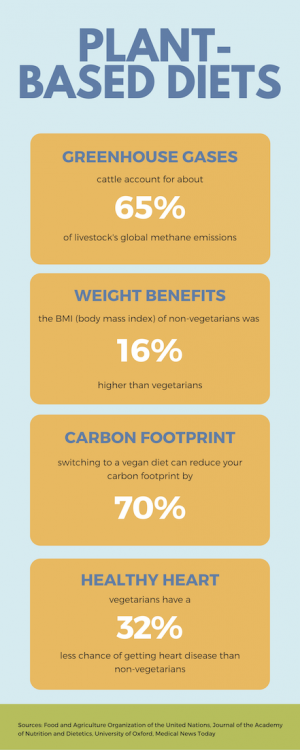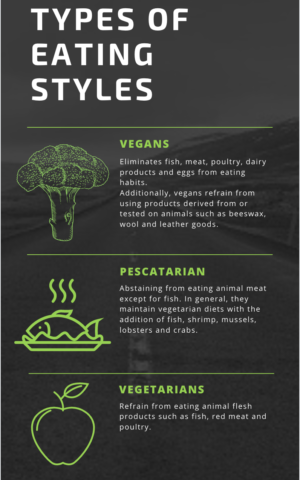Respect, accommodations toward vegetarianism should increase
September 21, 2022
“Excuse me, could I get a clean knife, please?” The Subway worker sighs deeply with an eye roll as he grudgingly goes to the back room to grab another knife. I feel guilty, but at least I can eat my sub in peace without the fear of cross-contamination from pre-cooked deli meats sitting around. This is a common experience for most vegetarians: limited respect when it comes to our dietary restrictions.

According to Cornell University, one in 10 Americans over the age of 18 say they do not eat meat. Despite this impressive statistic, most dining options still offer only a couple of measly vegetarian dishes: salads that are really only mounds of lettuce, soups that taste like water, pitiful “sandwiches” piled on with lettuce and half a tomato with, if we’re lucky, a spicy condiment drizzled on top. Meanwhile, on that same menu, sections feature seafood, poultry, steak and pork. Vegetarianism has been a movement for decades now, yet, the food industry still treats it as an afterthought when deciding menu options.
Associated with many religions originating in South Asia, including Hinduism, Buddhism and Jainism, vegetarianism has expanded to different countries across the world. As the concept rose to prominence, many people began trying vegetarianism and found numerous health benefits. Some factors that make vegetarianism appealing include its ability to protect against heart disease and cancer, aid weight loss, reduce risks of food-borne illnesses all while avoiding animal cruelty, according to EatLove.
However, despite there being widespread religious and health restrictions, vegetarianism is still not fully accommodated. Vegetarians are often bombarded with questions and mocked about their inability to consume meat and poultry. Comments like, “How much do I have to pay you to eat that meat,” or “You’ve never had chicken before? I could never!” are casual microaggressions thrown around that can feel disrespectful to followers of the diet. This ignorance makes it difficult for many vegetarians to feel comfortable in restaurants and public spaces.
Another form of vegetarianism, veganism, not only abstains from meat products but also does not consume any dairy products. A report published by Quartz states that veganism has become more popular than vegetarianism in the past two years. The years that vegetarianism took to even become recognized in America were bypassed by veganism’s quick rise to fame with trendy influencers and L.A. health critics bringing it into the limelight.
The concepts of fad dieting, dieting as a trend rather than an actual health restriction, and popularization of veganism through social media has made the popularity of this diet skyrocket, leaving vegetarianism to trail behind. Given that the popularity of this stricter form of vegetarianism has increased substantially, now more than ever, it is important that restaurants and the general public be inclusive of these diets.
World Vegetarian Day, on October 1, begins Vegetarian Awareness Month. WIth more of this country transitioning to veganism or incorporating elements of the vegetarian menu into their diets, it’s important to recognize and accommodate our dietary restrictions. Food ties us to our identities, and many diets are important to our cultural and religious backgrounds. Even if one decides to pursue these diets for simple reasons, we still should recognize that vegetarianism deserves the respect that all other diets have.





